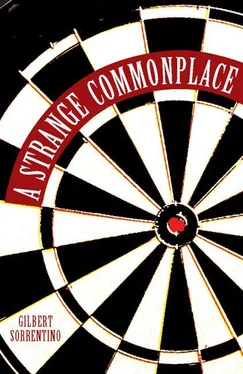IF HE SHOULD OCCASIONALLY GO INTO A SALOON ON THE way home from work, he’d often see her at the bar or at a table, in a purple velvet dress or a black gabardine suit. On the subway, she’d be standing, holding onto a pole, reading The Sacred Fount. She’d turn up on the street, in shorts, or in a suede jacket over a long flowered skirt. She’d be everywhere, although, as you may guess, she was but existent in his imagination. That’s the wrong word, one that is often used when the uncanny must be brought to heel. Perhaps madness, brief and flickering, is the word that covers these phenomena more accurately. Perhaps not. When he’d arrive home, there she really, as they say, really would be, in her actual, solid flesh. He would not look at her, but would change his clothes prior to making drinks for both of them. And although she had possessed, in the ruckus of their lives together, a purple velvet dress, a black gabardine suit, and a suede jacket, as well as more than one long flowered skirt, and many pairs of shorts, he would refuse to remember this fact, refuse to remember her owning or wearing these clothes. And the next day or week or month he’d find her again as he always found her, in a saloon, on the subway, turning into him as she rounded some corner, both of them far from home.
IN THE DINER, THE THREE YOUNG MEN EAT — STUFF THEIR faces, is an apt phrase — and patronize the waitress with happily disingenuous compliments on her pink polyester uniform, her hairdo and the net that covers it, her white crepesoled shoes. They ask her opinions on pop stars, hip-hop artists and grunge bands, her thoughts on music and clubs of which this exhausted fifty-three-year-old woman has never heard. And so she stands dumb before them, smiling the smile of the impotent insulted everywhere. These remarks and questions are delivered with a ponderous seriousness tempered by candid grins and occasional unsuccessfully stifled bursts of laughter. When they finish, they walk outside into the night and their interesting and valuable lives, and as one steps off the curb to look for a cab, he is, for somebody’s reason, or on somebody’s whim, or by somebody’s mistake, shot to death from the rear window of a car that is slowly moving down the street. His two friends, terrified, look at him sprawled in the wet, bloody gutter, his head half shot away. One says, “Jesus, Ray, Jesus,” over and over. The waitress picks up a paper napkin at their vacated table and finds beneath it her quarter tip. A nice touch for the morrow’s story in the Daily News.
IN THE PARLANCE OF THE ANONYMOUS YOUNG MEN WHO hung out, for years and wasted years, on the corner in front of the candy store, he’s the sort who thinks who the devil he is. He was born of Anglo-Saxon stock into an old exhausted and corrupted family with its roots in New England since before Napoleon was a cadet — another quaint locution much bruited about on the corner. He went to excellent prep schools, from which he was never in the least danger of being expelled, although for the rest of his life he obliquely suggested that he had been a wild student. From these he went on to Yale. Many of these years were spent ingesting drugs, if he is to be believed, the sly rogue. He was almost like the young men on the corner, for he understood them so well; he might as well have been one of them — tough, flexible, and distrustful of crude irony. Ah yes. This moment of adventure, as he later wryly called this period, served as the rough bona fides to remove him from the privilege that was and would always be his. Then he began to write fiction. His short stories and then his first two novels possessed the nice ability to tell readers, with subtle ironies meticulously sprinkled among suburban motifs, what they were certain they already knew: and did, a bright comfort. Touches of incest helped the prose considerably. So his career went well. Soon he became, if he is to be believed, an alcoholic, a lucky break, as the cynics on the corner might have said. For his alcoholism was prelude to his drying out, getting straight, choosing love and life, and realizing that simply being alive is, after all, good. This new venture into his psyche served as the entrée to ore, as he called it, for a “harrowing, courageous, and, finally, sadly redemptive” memoir, written in “fiercely intelligent prose,” in which he confesses to numerous flaws, failings, weaknesses, and sins, and implies that he does not, ever, expect to be forgiven for the things that he has done to friends, family, and loved ones. His forgiveness nonetheless ensues, and to the merry tune, as the guys might say, of more than reputable sales. He had unspoken fantasies of winning the Pulitzer Prize or the National Book Award or both, but settled for a week on the Times’ s “And Bear In Mind” list and a respectable film option. He hoped that John Cusack would play him in the movie that would surely be made, one that would be, he hoped, harrowing, courageous, and, finally, sadly redemptive. He might have said, however, film, the word favored by the young fellows in front of the candy store.
MY FIRST WIFE MET A WOMAN WHOSE NAME, AS I recall, was Claire. Met is perhaps the wrong word, since Claire was abruptly in my first wife’s life, or circle, as she liked to call it, and, in some vaguely peripheral way, in my own. My first wife knew many people whom I did not, nor did I want to. This arrangement, if that’s what it was, worked fairly well, or so I choose to believe: it was a long time ago. Claire, however, was someone I did get to know, slightly, but I can’t remember having a conversation with her about anything of a personal nature. What I do remember was her beauty. She was amazingly beautiful, possessed of a kind of innate, profound womanliness, a deep feminine actuality. The semi-idiotic pout that marks commercialized and marketable eroticism was foreign to Claire; she simply stunned people into silence, a silence that was, perhaps unsurprisingly, heavy with resentment. She neither adorned nor exploited this beauty, but was as Helen, Helen at that magical instant when she made Paris stupid with desire. Just before she died at twenty-three of ovarian cancer, I found out that she’d had a child at the age of twelve, a child who was the issue, it seems, of coterminous incestuous relationships that she’d carried on with her father and his younger brother, Uncle Ray. She called these entanglements romances. She wasn’t sure which of the two had fathered the child, whom she had drowned in the kitchen sink and left in a trash basket, snugly wrapped in the World Telegram, in Sunset Park. Odd that I should think of her after all these years, a memory occasioned by watching an old Irene Dunne movie on television. I don’t believe that her name was Claire after all.
NEW YEAR’S EVE, 1949. THE YOUNG MAN IS SITTING IN A booth in a Bronx saloon with a young woman. He doesn’t care for her but she is pretty. They had stopped off for a quick drink on the way to somewhere, a party, a Fifty-second Street club, a movie. Now it is 11:30 and they are still in the saloon, half-drunk. He is dramatically suggesting that he is falling in love with her, but this is a lie, and she, of course, knows it, despite her youth. She is, however, flattered that he should lie. She is seventeen, and wearing a black velour dress with silver stitching on the bodice, and the dress accents the soft contours of her breasts. Perhaps he cares for her more than he thinks he does, or perhaps it’s her breasts or her dress he cares for. Midnight. He leans across the table and kisses the girl, then gets up and sits next to her, puts an arm around her shoulders and a hand under her skirt. He strokes her thigh where the flesh meets the tops of her stockings. She doesn’t try to stop him but she keeps her thighs pressed tightly together. He kisses her again; perhaps he cares for her more than he thinks he does, or perhaps it’s her thighs or her stockings he cares for. He is nineteen. He’s saying vapid things to her and then suddenly says that he’ll meet her, no matter what, in five years, at the Rockefeller Center skating rink, where people look down at the rink, by the statue of Prometheus. What? she says. Who? The glamorous ice, he says. You know. He looks at her very closely. I could say bella bella, he says. You know that Saroyan story? She does not. About 1:15 A.M. They kiss in windless cold on the roof of her apartment building and manage a sex act that neither of them is much good at. Still and all, still and all. Five years pass, he is married. He actually goes to Rockefeller Center on New Year’s Eve, as dumb as they come. Another bad movie on a moronic theme. The wind is strong and bitterly cold, and his wife will be very angry yet hatefully silent that he has not shown up at the quiet little boring fucking party that her boring fucking friends in her circle, as she calls it, give each year. Suddenly, he can smell the girl, a light perfume, or soap, an ingenuous smell, and he turns around, but she is not there. She will not be there. He circles the block, looking at faces. Perhaps he cares for her more than he thinks he does, but he doesn’t. What is it, then, that he does care for? She will not be there. I could say bella bella, he says in a whisper. He heads for the subway and his wife and the little boring party. Better late than never. Maybe.
Читать дальше











